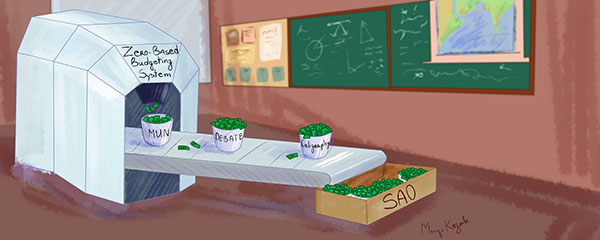District switches to zero-based budgeting system

Illustration by Margo Kazak
November 12, 2018
Beginning this year, District 225 implemented a zero-based budgeting policy in which budgets are dependent purely on necessity. This policy affects the athletic, academic and student activities departments of both GBN and GBS. Casey Wright, associate principal of administrative services believes that the zero-based budgeting system will aid in making budgeting more intentional.
“[Budgeting] is based on need and requests, so with this method we assume that each budget account starts at zero,” Wright said. “We look for trends that occurred in previous years so we get an idea for what types of things we’re purchasing.”
At the start of each school year, Josh Koo, associate principal of student activities, and Wright meet with club sponsors, instructional supervisors and the athletic department to discuss budget needs. Both Koo and Wright say they encourage South students and staff to hold conversations if they do not feel their budgeting needs are being met. Debate Sponsor Tara Tate discussed fiscal changes with Koo and Wright and expressed support for the change as it utilizes tax dollars more responsibly.
“[We had conversations with] Mr. Wright and Mr. Koo where we were [looking at] increases in our expenditures,” Tate said. “For example, just like salaries rise, the need for us to pay our judges and officials did as well so we walked through what changes [to make] in regards to what we are spending and then [looked] at the budget from that perspective.”
The new zero-based budgeting system encourages fiscal responsibility and proportional equity, Wright says.
“The problem with giving the same budget that was [given] last year is that [sometimes they are] inflated budgets,” Wright said. “Maybe [last year a school entity] didn’t need all [their allocated budget], but you don’t want to lose [the money] so you don’t say anything. Sometimes [surplus] encourages unnecessary spending.”
The Student Activities Office, under Koo, allocates the funds to South clubs. In the past, larger clubs could have surplus in their budget while smaller clubs would not receive enough funding to provide the club’s necessities. Now, with the zero-based budgeting system, the needs of clubs are assessed before money is distributed which provides many smaller clubs with funds previously unavailable, according to Koo.
“I’ve tried to be more intentional about creating more inclusion,” Koo said. “It used to be only that a handful of clubs had access to the available funds. Because we are going to zero-based budgeting, I am fulfilling the needs that everybody has.”
One such club that has benefited is Calligraphy Club. Sponsor Laura Croak explains that the new budgeting system has helped Calligraphy Club obtain materials, such as felt-tip markers and paper, that they otherwise could have purchased only after fundraising.
“[Zero-based budgeting] helped us get up and running since we are a brand-new club,” Croak said. “It helped us get a base of materials to start off [and] help students explore the art of calligraphy before they purchase their own supplies or continue to use what GBS has to offer.”
Despite the changes to district budgeting, Wright’s goal is for both students and staff not to feel a drastic change in the way the school functions.
“In the end, I want teachers and students to have the resources to do their best work,” Wright said. “If we don’t know about needs, we cannot respond to them.”
Athletic Director Steve Rockrohr says that the new policy will not impact athletic teams, as the spending of the athletic department has been conservative over the years.
“It shouldn’t affect GBS athletics in any way whatsoever, but it is a change from getting a pot of money to spend how I want to,” Rockrohr said. “[Now the district is saying], ‘What do you want to spend it on and we will tell you if you can.’”
The budget of South’s clubs are largely funded by the sale of activity passes during book sale before the start of the school year. According to Koo, the sale of activity passes has decreased significantly and impacted club budgets, thus reaffirming the district’s decision to move towards zero-based budgeting.
“We couldn’t keep the same model,” Koo said. “We didn’t have the same revenue streams to do that anymore.”
Koo said that the sale of activity passes will be a focus of the Student Activities Office as the year progresses and as funds are needed for next year’s clubs.
“Maybe what we offer now isn’t incentivizing students,” Koo said. “The only caveat is the price of it [because it] has to be the same between Glenbrook North and Glenbrook South [since] it’s a district fee. I’m looking to make the activities pass a more desired product and then adjusting.”


